|
April 24, 2020
Health Care Workers Step Up Their Fight to
Protect Themselves and the Public
A Most Pressing Concern
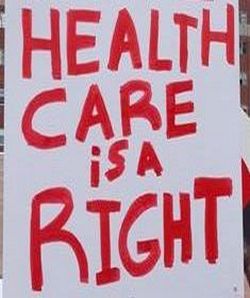  
Nova Scotia
• Immediate Action Required to Protect Seniors and Workers at Northwood Manor
- Nova Scotia Government and General Employees Union
• Workers Call on Public to Demand Government Provide Personal Protective Equipment
Quebec
• Nursing Graduates Address Letter to Premier
Ontario
• Long-Term Care Nurses Protest Untenable Working Conditions
Saskatchewan
• Workers Report Initial Gains in Protecting Long-Term Care Residents
British Columbia
• Conditions of Health Care Workers and Seniors
- Interview, Rhonda Bruce, Rehabilitation Assistant and Regional Vice-President (Interior), Hospital Employees' Union
Health Care Workers Step Up Their Fight to Protect Themselves and the Public
A most pressing concern during the COVID-19 pandemic is the staggering number of deaths of seniors and health care
workers from the disease. There is an urgent need for seniors' homes
and long-term care centres to be properly staffed and provided with
adequate working conditions for all personnel, including full
protective equipment. Just as urgent is the need to provide the
problems in this sector with viable solutions. This issue of Workers' Forum continues to address how health care workers are playing a leading role in this work.
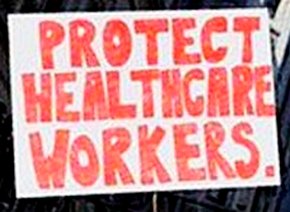 Health
care workers are the first line of defence for the health and safety of
seniors in continuing care facilities. Their demands and solutions must
be taken seriously and implemented to resolve the crisis in a way that
favours the people. For years, the workers and families have raised the
state of affairs in senior's homes which now, with the
pandemic, are causing such tragedies. By smashing the silence on the
conditions there and how the demands of the workers are dismissed out
of hand, one aim is to make sure governments do not get away with
merely wringing their hands and crying on television but must end the
privatization of seniors' care and health care as a whole and
increase investment in social programs. Health
care workers are the first line of defence for the health and safety of
seniors in continuing care facilities. Their demands and solutions must
be taken seriously and implemented to resolve the crisis in a way that
favours the people. For years, the workers and families have raised the
state of affairs in senior's homes which now, with the
pandemic, are causing such tragedies. By smashing the silence on the
conditions there and how the demands of the workers are dismissed out
of hand, one aim is to make sure governments do not get away with
merely wringing their hands and crying on television but must end the
privatization of seniors' care and health care as a whole and
increase investment in social programs.

Nova Scotia
- Nova Scotia Government and General Employees Union -

NSGEU nurses redeployed to Northwood Manor are
reporting extremely serious concerns about the health and safety of
vulnerable seniors due to poor infection control and limited safety
protocols at the facility.
Government's Ministerial Order forced nurses and other
health care workers to leave the Halifax Infirmary and report to the
epicentre of the COVID outbreak at Northwood. NSGEU members are working
at 11 Manor, an 11th floor unit with a capacity of 16 and an occupancy
of 12 residents, and 1 Centre a first-floor unit with a capacity of
22-23 beds which is fully occupied. Both are COVID-positive units.
One staff member described the conditions at Northwood
Manor as "horrible" and noted there is little wonder why the virus has
run rampant through the facility, given the lack of Personal Protective
Equipment (PPE) and basic infection control protocols in place.
"Our members are telling us it was like walking into a war zone," said NSGEU President Jason MacLean.
"They desperately want to help these seniors in their
terrible time of need. But for the safety of those seniors and the
staff, this has to be done correctly or things will continue to
deteriorate."
Here is a list of a few of the concerns these frontline workers have brought to our attention:
- Lack of infection control measures to protect vulnerable seniors and front line workers;
- Lack of appropriate PPE available on both units;
- Lack of consistent, thorough cleaning of these units;
- Clustering of both negative and positive seniors together on some
units, making it confusing as to who is positive or negative;
-
Lack of patient armbands to identify which patients require medications;
- Lack of "clean rooms" (a space that is not accessible to patients
where staff can safely don PPE without risk of contamination);
- And lack of garbage receptacles to properly dispose of contaminated
PPE, so workers must carry them through the unit, potentially
contaminating "clean" areas.
The NSGEU brought these concerns forward to the Premier,
Minister of Health & Wellness, and Chief Medical Officer on Monday,
April 20, but NSGEU members continue to report concerns that put both
seniors and workers at risk.
"Our nurses and frontline healthcare workers have put
their own personal safety and lives on the line by going to work at the
epicentre of the COVID-19 crisis, and they feel betrayed by our
government," said MacLean.
NSGEU is calling on government to take the following
steps to ensure our members can continue to provide much needed care to
the residents and staff at Northwood Manor:
- Allow these workers access to N95 masks, as these are COVID-positive units;
- Ensure PPE supplies are available at the entrance of each room, so staff are able to safely respond to a patient in crisis;
- An increased and sustained presence of Infection Control to educate staff and ensure protocols are being followed;
- Allow
these units to develop a model of care and staff appropriately for patient ratio and acuity;
- Removal of humidifiers from all patient rooms;
- Ensure units are deep-cleaned by housekeeping and then maintained with regular cleanings per day;
- Establish clean rooms for donning PPE, charting and breaks;
- And provide yellow bags
to ensure contaminated PPE is disposed of properly and ensure there are sufficient receptacles in each patient room.
NSGEU frontline healthcare workers remain committed to
working with government to fight COVID-19 and protect vulnerable
seniors at Northwood Manor, provided they are supported and feel safe
at work.
"Premier McNeil needs to learn to work collaboratively
with workers, and to hear and respect the concerns they are bringing
forward. They are the trained professionals, and they know what is
needed to protect both them and the clients," MacLean said.
"By forcing our members to work without the appropriate
safety protocols in place, government is essentially forcing them to
put their license to practice on the line, as well."
NSGEU and the other unions representing frontline
healthcare workers already had the Good Neighbour Protocol in place,
and had reached an additional agreement with government to call for
volunteers to temporarily redeploy to Northwood Manor. The Premier's
order to force workers into the Manor was unnecessary and, without the
proper
precautions taken, potentially put more lives at risk.
Furthermore, management did not notify health care
workers of their redeployment: they learned of the move from social
media posts and the news media.
We are only going public with these concerns now because
we have exhausted all other avenues to deal with the safety issues and
concerns for the residents and our members.


In a press release dated April 16, the Canadian Union
of Public Employees (CUPE) Nova Scotia is calling on the public to
demand that provincial government provide frontline health care workers
all the personal protective equipment they require.
The press release reads:
"Health care workers are here for all of us, doing
everything possible to keep Nova Scotians safe. They're on the
frontlines of the COVID-19 pandemic, working around the clock to stop
its spread and to care for those who are infected. But there's still no
protocol for workers to get the appropriate Personal Protective
Equipment (PPE). They
need your help to make this happen.
"They need you to tell the Nova Scotia government to
make sure our frontline health care workers have the appropriate PPE so
they can do their jobs safely."
With the press release comes an email message that people can send to the government.
The message reads:
"Our health care workers always put patients first. And
during the COVID-19 pandemic, these workers are on the frontlines,
working around the clock to stop its spread.
"Every hour, they are keeping people safe and saving
lives. But too many frontline health care workers are working without
the appropriate Personal Protective Equipment (PPE) they need to
protect us all. They are being sent to the frontlines of this pandemic
without the right tools to stay safe and keep all Nova Scotians safe,
too.
"Protecting health care workers protects us all. And it's time for the Nova Scotia government to step up.
"Government must provide better access to PPE for all
health care workers, and trust these professionals to use their
judgement in assessing the level of protection required to keep
themselves and their patients safe. Ontario, Alberta, British Columbia
and New Brunswick have all reached agreements with their health care
workers, and it's time
for Nova Scotia to follow their lead.
"The government must follow the precautionary principle,
established in the aftermath of the SARS epidemic. It states that where
there is scientific uncertainty about the possible causes of
transmission, we must err on the side of caution. That's why we must
ensure health care workers are afforded fit-tested N95 respirator masks
when
interacting with possible or confirmed COVID-19 cases.
"Nova Scotians are all in this together, united. Each of
us is doing our part to help flatten the curve. But when our health
care workers get sick, they can't take care of patients, residents and
clients, and that puts all of us at greater risk.
"As a member of the provincial legislature, I urge you
to act immediately to protect our nurses and frontline health care
workers. All health care workers must have the PPE they need to do
their job safely."
To sign the message, click here.

Quebec

Letter to Quebec Premier François Legault and his entire extraordinary team.
On behalf of the next generation of nurses.
Mr. Legault, your press briefing on April 15 at 1:00
pm made me fall off my chair, just as it did many of my colleagues.
Personally, it made me lose confidence in the way you are managing this
crisis in the Long-Term Care Facilities (CHSLDs) and even in the
consideration you have for the nursing vocation. Are you panicking?
Because in hearing how you talk, you seem to be
forgetting that Quebec has a significant quantity of competent staff
actually waiting to help and who have graciously been offering to
assist since the start of the pandemic.
Mr. Premier, do you know how many graduates we have in
health and nursing that are qualified to provide the care you are
appealing for in the CHSLDs?
Factually, Mr. Legault, there are indeed many. And they
already have more training than nursing assistants and orderlies.
Beginning in May, as soon as their graduation is official, they will
become candidates for the nursing profession and will perform the
duties of registered nurses in our communities while waiting to pass
their Quebec Order
of Nurses' (OIIQ) examination in the fall.
Do you know what all this beautiful, cheap and healthy workforce is doing right now and will be doing for the next four weeks?
Taking improvised online courses, too often of poor
quality. Doing online internship work, which in no way compensates for
the essential experience that come with a real internship. All this
under appalling conditions of social inequality, without any coherence
between educational establishments. To boot, they have no guarantee of
graduating
as planned in May, as their professional order (OIIQ) has yet to
validate or plan anything official that will allow them to access the
profession at the beginning of May (due to the cancellation of the
final internship of their 3-year advanced education training).
In addition, you are currently urging their teachers to abandon them to join the CHSLDs, obliged under force majeure, seriously threatening their already uncertain graduation.
Mr. Premier, if the situation is so critical and now
requires asking medical specialists with salaries beyond the system's
means, who do not have the qualifications to practice as nurses, to go
to the CHSLDs, would it not be time to do like many other countries and
consider our nursing graduates?
With all due respect, Mr. Premier, you appear to have
the mistaken and awkward belief that the work of a nurse is beneath,
rather than parallel and complementary to that of a doctor. As if a
doctor had to master training as a nurse before being able to become a
doctor. As if at university, that after studying nursing one continues
on with accredited courses into medical school. Unfortunately, besides
being degrading for the nursing profession, your perception is
completely false and out of touch with reality.
Contrary to what you said during the previous press
briefing, most of our doctors are not "overqualified" for the job, but
untrained for the position. Most of them do not know how to take a
blood sample, insert a catheter, perform ostomy care, apply specialized
dressings, etc., or almost any nursing skills acquired after at least
three years of solid training, combined with internship experience to
master them. Unlike our graduates in care giving and nursing, for the
most part they never learned to master the methods of safely moving
patients according to [the established guidelines].
With your plan, which has become the subject of a lot of
talk, you are using taxpayer money, our money, to pay doctors an
exorbitant stipend even though they'll be doing at most only half of
the work that nurses do. You cannot expect that they will be able to do
much more than that with their valuable medical skills. For the vast
majority of
them do not even know how to install and adjust an intravenous infusion
pump.
And of course that's to be expected because it's not
their job, they haven't learned how to do it. Their essential
skills lie elsewhere. You would not ask nurses to do the work of
doctors. Well, it's the same thing. This hierarchy of health
professions is a stubborn social prejudice. Please, Mr. Premier, do not
feed that prejudice which is at
the base of the faulty remuneration of our health professionals and the
lack of recognition of these valuable professions within the system. Do
not act as the vehicle of these false beliefs of another era.
I ask of you Mr. Legault, Mr. Premier and all your
team, that for the sake of the safety of all our patients and cherished
elders, for the sake of efficiency and out of respect for the
nursing profession, which is not the basis for the profession of
physician but, indeed, a full-fledged complete profession parallel and
complementary to medicine, and
so as not to place our valuable doctors in the awkward position of
having to admit that they do not have the skills required to
effectively replace a seasoned nurse, to consider the option of
requesting the assistance of our graduating nurses and in the process,
credit them for the 3-4 weeks of inconsistent and disconnected lessons
they are currently
being required to take online instead of responding to the current
vital emergency.
Mr. Premier, give the CHSLDs the competent and efficient
workforce they expect while saving our money by limiting our expenses
and allowing our graduates and their professors to put their nursing
skills to good use -- a profession, a vocation, still too little
known and recognized.
Cordially and probably very awkwardly,
Graduating nurses of Quebec.

Ontario
 On April 15, the Ontario Nurses' Association (ONA) issued a press
release in which it denounces the working conditions for nurses and all
health care workers in long-term care homes as "unfathomable." The
statement points out that health care staff require immediate access to
proper personal protective equipment (PPE) to stop the spread
of COVID-19 to vulnerable residents.
On April 15, the Ontario Nurses' Association (ONA) issued a press
release in which it denounces the working conditions for nurses and all
health care workers in long-term care homes as "unfathomable." The
statement points out that health care staff require immediate access to
proper personal protective equipment (PPE) to stop the spread
of COVID-19 to vulnerable residents.
"As the media has noted, dozens of long-term care
facilities across Ontario are reporting COVID-19 outbreaks and resident
deaths," writes ONA President Vicki McKenna, RN. "Our hearts go out to
the residents and their families, and to the staff who provide the
day-to-day care -- and who consequently become very close to their
residents.
Our nurses and all health-care workers in this sector are doing the
very best they can, even as dozens of them have become infected
themselves."
The press release stresses that long-term care homes
were understaffed before the pandemic and are now in crisis. It notes
that the ONA has been calling for changes and PPE for all workers since
the pandemic began and that it will continue to call for action until
the government acts to protect some of the most vulnerable Ontarians.
Amongst others, the changes the ONA is demanding include:
- Immediate access to appropriate personal protective
equipment, including N95 masks, when caring for suspected or confirmed
COVID-19 positive residents -- if staff are not safe, neither are
residents.
 -
An immediate strategy to separate COVID-19 residents from non-COVID-19
residents -- and the separation of staff caring for each group -- to
prevent the contamination of PPE and reduce the spread of the virus
inside long-term care homes. -
An immediate strategy to separate COVID-19 residents from non-COVID-19
residents -- and the separation of staff caring for each group -- to
prevent the contamination of PPE and reduce the spread of the virus
inside long-term care homes.
The ONA has been calling for part-time and casual staff
at long-term care centres to be limited to one facility by increasing
part-time workers' hours to full-time, or paying for lost wages. The
statement informs that because of the pressure exerted by health care
workers, the Ontario government has started to act on that demand.

Saskatchewan
On April 17, the Canadian Union of Public Employees
(CUPE) Saskatchewan reported that after weeks of pressure from CUPE and
other health care unions, the Government of Saskatchewan has finally
announced a continuous masking policy for health care providers, and a
transition to single site employment for workers in acute and
long-term care. This move puts in place protections for the at most
risk demographic: long-term care residents.
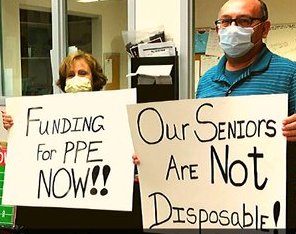 "Long-term
care homes have been at the centre of major COVID-19 outbreaks in other
provinces and account for the majority of deaths attributed to the
virus," says CUPE Local 5430 President Sandra Seitz. "Halting
multi-site work will help stop the spread of COVID-19 by limiting
movement between seniors' care facilities." "Long-term
care homes have been at the centre of major COVID-19 outbreaks in other
provinces and account for the majority of deaths attributed to the
virus," says CUPE Local 5430 President Sandra Seitz. "Halting
multi-site work will help stop the spread of COVID-19 by limiting
movement between seniors' care facilities."
The communiqué points out that COVID-19 has
placed a spotlight on some of the most serious issues in health care:
underfunding and short staffing.
"Staffing levels in long-term care have been inadequate
for years. COVID-19 has exacerbated this issue, and our members are
working short staffed more often than not," said Seitz. "Physical
distancing protocols such as in room dining for residents and increased
cleaning requirements means we need more staff, not less."
"The continuous masking policy is a start, but the
government needs to take steps to ensure that it is being implemented
across the health care sector, and all community-based services," said
Seitz.
The press release also informs that CUPE 5430 has
secured a Letter of Understanding (LOU) protecting its members during
redeployment. The LOU lays out the following protections for workers
and residents:
- Prevent workers from working in multiple facilities while maintaining their guaranteed hours.
- Create a labour pool for redeployment to respond to
COVID-19 health care needs within clearly established parameters that
protect the public and the workers.
- For the duration of the agreement, there will be no new layoffs.
- Employees who have been redeployed will be protected from incurring expenses, including accommodation where required.
- All redeployed employees will be provided with
orientation and training fitting with the situation at the receiving
site, which includes orientation and training to the required personal
protective equipment (PPE) and provision of said PPE prior to
commencing work.
"We have seen a significant rise in precarious work in
our health care system. Many of our members are forced to work multiple
jobs, across jurisdictions, to cobble together full-time equivalency
work," said Seitz. "This LOU will offer some protections to our members
who are facing changes in the work environment from COVID-19."

British Columbia
- Interview, Rhonda Bruce, Rehabilitation Assistant and
Regional Vice-President (Interior), Hospital Employees' Union -
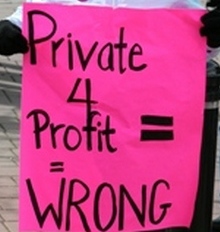 As of April 22 there were 19 outbreaks in long-term care and assisted
living facilities in British Columbia and workers are taking measures
throughout the province to prevent further outbreaks. This is not just
a matter of the vulnerability of the seniors who live in these
residences. For decades, workers and families of residents have been
sounding the alarm about the conditions in long-term care and assisted
living homes, particularly those that operate for private profit.
"Normal" conditions mean workers who are absent not being replaced,
excessive overtime and thousands of hours of unpaid work being done by
visitors and volunteers. The sudden loss of family members and
volunteers during the pandemic has made a bad situation even worse.
Workers in long-term care are speaking out about what is needed to be
able to do their jobs safely, to protect their residents, their
families and communities and themselves.
As of April 22 there were 19 outbreaks in long-term care and assisted
living facilities in British Columbia and workers are taking measures
throughout the province to prevent further outbreaks. This is not just
a matter of the vulnerability of the seniors who live in these
residences. For decades, workers and families of residents have been
sounding the alarm about the conditions in long-term care and assisted
living homes, particularly those that operate for private profit.
"Normal" conditions mean workers who are absent not being replaced,
excessive overtime and thousands of hours of unpaid work being done by
visitors and volunteers. The sudden loss of family members and
volunteers during the pandemic has made a bad situation even worse.
Workers in long-term care are speaking out about what is needed to be
able to do their jobs safely, to protect their residents, their
families and communities and themselves.
Workers' Forum interviewed Rhonda Bruce, a front
line long-term care worker in British Columbia. She is a rehabilitation
assistant and a member of the provincial executive of the Hospital
Employees' Union (HEU).
Workers' Forum: What measures have been taken to prepare in your workplaces to deal with COVID-19?
Rhonda Bruce: What they have done in the
hospitals is they have sent many patients home and made preparations
for caring for COVID-19 patients. Many hospitals are at less than 50
per cent capacity. Some long-term care facilities have outbreaks of
colds or flu. What's changed is that before when you had an outbreak
they
had to have three residents with symptoms for three days to declare an
outbreak and now if they have one resident with a cold then they shut
the facility down to visitors and introduce special infection control
measures. A lot of sites in the province have been declared to be on an
outbreak because it's cold and flu season. As soon as somebody
gets a cold they shut everybody down, which means no recreation
programs at all. Many sites have central dining rooms which are usually
pretty packed. Most residents eat in dining rooms, but are separated
when there is an outbreak declared. Instead of eating in a dining room
residents are eating in their rooms or other areas. Even with
recreation
and other staff being re-deployed to help there are not enough staff
for this or for the extra cleaning that is required, and so on.
Recreation programs are not taking place. People are also needed to
arrange video calls to family for residents so they can see their
family because no visitors are coming in.
WF: So you're in preparatory mode for COVID-19. Do workers have what is needed?
RB: We have some problems in some places.
The Ministry of Health said that they were going to take care of all
our workers with child care but that is not always taking place. I know
of a case of a young mother who has a toddler and no daycare. She tried
to get special leave. We have a provision for special leave in our
contract and this worker has a special leave bank. They refused to give
it to her. She had four days where she didn't have a family member to
support her to give her child care because her child care was
cancelled. This is stressful every single day for parents of young
children. Then of course there are lots of memos from the Health
Authorities
and managers giving different interpretations of the memos and
sometimes giving wrong instructions to the workers regarding personal
protective equipment (PPE). Last week a dietary worker in one of the
long term care homes said they had been told they have to change their
gloves after each person served. The person serving has gloves on
and never touches the resident so that makes no sense and they will
just burn through the PPE and not have them when they are really
needed. That protocol applies for staff who are feeding residents, who
of course have to change gloves and wash their hands between residents.
Many hospitals and long-term care facilities share
casual employees between them and have float pools -- workers that go
to different areas of the hospital or residence or even between
facilities as needed. There was a case recently of a nurse who was
doing front line work -- first response triage in an Emergency
Department -- who the next
day went to work in a long-term care facility. This is playing with
fire. If that nurse is the first person dealing with a patient who is
found to have COVID-19 and became infected they would be bringing it
straight to the vulnerable seniors in the long-term care home. So far,
although the province has restricted movement of staff between
long-term
care facilities, there is no restriction on staff moving between
hospitals, group homes and long-term care.
WF: What was the situation prior to the COVID-19 pandemic and measures to prepare for it?
RB: Throughout BC there is overtime almost
every shift because there is not enough staff. There never has been
enough staff. We have lots of casual workers and most of them want
full-time work. They have to work in three or four places, wherever
they can get their hours, because they need to make a living.
WF: What is the reason that more full time and part time positions are not created?
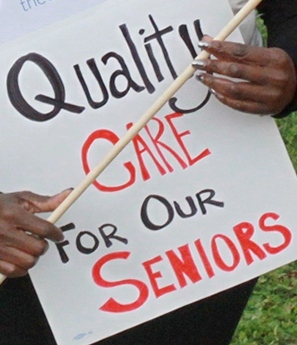 RB:
Because the employer saves on benefits. Casuals don't have benefits.
Lots of time people take part-time positions, which do have benefits, and
then they pick up more work. Not all long-term care sites are covered
by the Facilities Bargaining Association (FBA) Collective Agreement
where industry standard wages and benefits
are in place, under a master agreement for the province. There are
other long-term care homes in the region that are private and have
lower wages. In the sites which are privately operated for profit, and
the wages are much lower than those in the Facilities Agreement, the
workers try their best to get a job at another workplace. They can even
be
working full-time but if they get a job in an FBA site they'll leave.
There are always lots of workers stepping out of those sites when they
get work in an FBA site. RB:
Because the employer saves on benefits. Casuals don't have benefits.
Lots of time people take part-time positions, which do have benefits, and
then they pick up more work. Not all long-term care sites are covered
by the Facilities Bargaining Association (FBA) Collective Agreement
where industry standard wages and benefits
are in place, under a master agreement for the province. There are
other long-term care homes in the region that are private and have
lower wages. In the sites which are privately operated for profit, and
the wages are much lower than those in the Facilities Agreement, the
workers try their best to get a job at another workplace. They can even
be
working full-time but if they get a job in an FBA site they'll leave.
There are always lots of workers stepping out of those sites when they
get work in an FBA site.
WF: What kind of things is the union advocating for?
RB: There are things that can be done
right now. Workers who need it should be able to use their special
leave bank. Our employers could make sure we have meals, coffee from
time to time, increased funding for uniforms and shoes because of the
new rules, proper changing facilities. People who are not on the front
lines
don't understand what it is to be in the situation we're in. We been
working on the brink for so long and this situation is even worse, so we
need support and employers have to listen to us. We all want to stop
this. We are all committed to the residents that we care for. Our
collective agreement is being respected. The union is really advocating
for
us. As an HEU provincial executive officer on the front line, I still
have a job to do. I spend most of my day doing occupational safety,
instructing people on PPE, etc. and constantly answering questions. My
manager is working with me. I can't imagine what it is like for workers
in Ontario and Quebec where their collective agreements are not
being respected. How can you walk the extra mile in those conditions?

(To access articles individually click on the black headline.)
PDF
PREVIOUS
ISSUES | HOME
Website: www.cpcml.ca
Email: office@cpcml.ca
|

